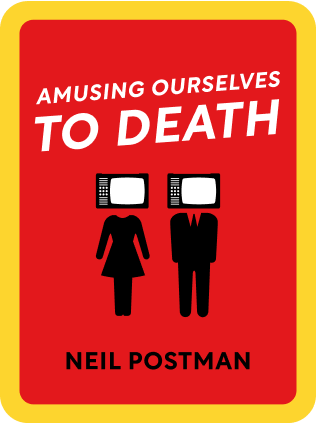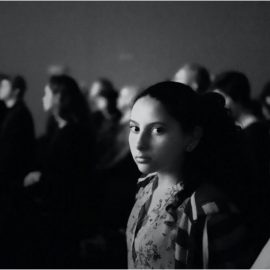

This article is an excerpt from the Shortform book guide to "Amusing Ourselves to Death" by Neil Postman. Shortform has the world's best summaries and analyses of books you should be reading.
Like this article? Sign up for a free trial here .
Are we living in a post-truth world? How did modern society come to value entertainment over truthfulness? And how has looking good on camera become all that matters?
Neil Postman, the author of Amusing Ourselves to Death, believed that we were entering a post-truth world—and since this book was published in 1985, many believed we have entered this era already. Postman feared that the public cared more about the entertainment value of the news rather than the truth and relevance of the information.
Here is how the invention of television pushed us into the post-truth era.
Do We Live in a Post-Truth World?
At the time Amusing Ourselves to Death was written, the phrase, “Now, this …” was commonly used on television newscasts to signal a transition to a lighter story or a commercial. However, on another level, the phrase was an acknowledgment that television’s presentation of the world had no coherence or meaning.
The problem is that when news is presented without seriousness, context, coherence, or rationality—the criteria for judging credibility in print culture—it’s difficult for a TV audience to know what to believe. Here again, television has changed the meaning of both information and credibility and has brought about a post-truth world.
In the past, information was believed if it reflected reality. In contrast, on television, whether a message is deemed truthful depends on the attractiveness, authority, and authenticity projected by the presenter/performer.
This has serious implications. If credibility on television (not actual truthfulness) is what counts, politicians don’t have to tell the truth—they just have to appear sincere. Thus, Nixon’s biggest problem wasn’t lying, but looking like a liar on television.
In contrast, Ronald Reagan, a former actor, looked good and came across as so sincere on television that his frequent distortions and misrepresentations didn’t undercut his popularity or likeability. In fact, as public interest in his presidential misstatements declined after some initial news coverage, so did further reporting on them.
The Meaning of Being Informed
Thanks to television, Americans may be the most entertained nation on earth, while at the same time, the least well-informed.
Even when events get widespread news coverage, people still know little in terms of history, context, or implications. Yet everyone has an opinion. But in today’s post-truth world, opinions are more like emotions than they are like the nuanced and informed opinions people formed in the 18th and 19th centuries. Polling indicates that today’s opinions change, like emotions, from one day or week to the next.
The information Americans possess is really a type of disinformation. In the 1980s, disinformation referred to bits and pieces of misleading information spread by Soviet and U.S. spies, which created a false sense of knowledge. Disinformation is also a consequence of packaging news as entertainment. We know about a lot of things without knowing anything in any depth.
However, there’s a worse prospect than lacking good information—it’s no longer even knowing what it means to be well-informed. Ignorance can be remedied—unless people mistake it for knowledge.
Accustomed to Incoherence
Another problem when news and information are presented in discontinuous fragments is that people become accustomed to incoherence. This makes it even harder to assess the truth.
Many of Reagan’s misstatements were contradictions—he made assertions that were mutually exclusive—that is, two statements couldn’t both be true in the same context. However, he got away with some contradictions (as other politicians also do) when his statements were reported as isolated fragments and not compared to each other. When statements are presented without context, contradictions disappear.
We’re so used to getting information in fragments that we don’t look for coherence and so, don’t recognize contradictions.
This isn’t Orwell’s world of “newspeak,” where lies are presented as truth. It’s Huxley’s world, where there’s no need for authorities to hide information—people are so distracted by a system organized for their amusement that they accept illogic and don’t recognize contradictions.
A World of Trivial Pursuit
We live in an information environment that could be labeled Trivial Pursuit, like the board game, where facts and news are a source of entertainment.
Television determines what form news takes and how we respond to it. In organizing and packaging news as entertainment, television influences other media—newspapers, magazines, and radio—to follow suit.
For instance, USA Today was modeled on the format of television: it pioneered the presentation of brief stories, color graphics, and many images. This resonated with other newspapers, which did the same thing. People magazine became another example of a print publication echoing television by presenting news as entertainment. Meanwhile, Entertainment Tonight and similar television programs portrayed entertainment as serious news. In a closed loop, news became entertainment in both form and content.
Meanwhile, radio expanded from music to entertainment by incorporating talk shows with a format that appealed to listeners’ emotions and amused them with insults.
Nations throughout history have overcome lies, but whether a culture can survive trivialization of news remains to be seen.

———End of Preview———
Like what you just read? Read the rest of the world's best book summary and analysis of Neil Postman's "Amusing Ourselves to Death" at Shortform .
Here's what you'll find in our full Amusing Ourselves to Death summary :
- How television reshaped our culture and trivialized public life by turning it into entertainment
- Why America is moving towards a dystopian, Huxleyan future
- What you can do to gain control over the technology in your life






